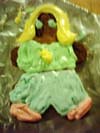I've been trying my best to recall a quote by Franz Kafka describing the essence of Yiddish. If I remember correctly, he explained that the language was verbal expression of everything the gentiles felt about European Jewry. Yiddish is a bastardized German, mutated like a cancer cell, laid out in letters from the dark places of the Middle East. Spoken by an alien people who moved from one walled ghetto to another, the language, like the Jews, was at once disturbingly familiar and troubling foreign. Trouble is, in the late nineteenth into the early twentieth centuries, many European Jews felt the same way.
Enter Itsik Malpesh, a Yiddish poet from Kishinev. Through his eyes, we see the plight of the Eastern European Jew a century ago, a life of fear and trepidation. He survives a pogrom, a forcible drafting into (and escape from) the Russian army, and life in Odessa as the ports slowly closed on Jewish emigration. Smuggled out of the Old World in a trunk of Hebrew letters meant for Yiddish presses in the New World, Malpesh struggles to compose his poetry amidst the frustration of learning English and the American way of life. Throughout his travels in the novel, one theme remains the same: the uneasy standing of Yiddish in both the Jewish community and the world at large.
One chapter in particular captures the combative nature of the Jewish “national” languages, Yiddish and Hebrew. A Zionist-leaning Jew in a bar is intent on resurrecting Hebrew, a language that was more ancient dust in the mouth than anything, while a socialist Jew insists that Yiddish will always hold the Jewish heart. In a vaudevillian routine that would make any respectable Catskills comedian jealous, the two battle for the linguistic fate of a 5,000 year old religion. Sides are chosen, drinks are thrown, and Jews continue to perpetuate the “two Jews, three opinions” saying into eternity.
There’s a clear winner in the battle of the tongues. Yiddish maintains an uneasy throne in tiny Jewish communities, most of its kingdom buried in mass graves dotting the European countryside. Hebrew, on the other hand, has turned from dust in the mouth to a breath of life to Jews from all over the world. It’s telling that I, an Ashkenazi Jew whose grandmother spoke Yiddish in her childhood home, can speak whole sentences in Hebrew and only swear haltingly in Yiddish. With one’s decline came another’s birth.
Surprisingly, author Peter Manseau is Catholic, the product of a priest and a nun (his memoir Vows: The Story of a Priest, a Nun, and Their Son is on my Cannonball list). His story is also part of this novel—the translator who shares Malpesh’s story (and occasionally inserts his own commentary) shares quite a few characteristics with Manseau, who worked at a Yiddish book conservatory in New England. Peter Manseau, for those of you who insist that their authors be nice people, is a nice person. Anyone who can deal with a line of cranky old Jewish women and still remain smiling when he signs my book is a keeper.
Adorableness of the author aside, Songs for the Butcher’s Daughter is a deep book, a book that I can’t possibly explain in a poorly executed review. It transcends religions, continents, and languages. It’s a strange and wonderful novel that I was sad to put down. Now it’s time to foist it off on my family and see if they get anything out of it.
Verdict: Buy!
Subscribe to:
Post Comments (Atom)








oh you really make me want to read this book! as for yiddish-to me its ugly mixture of deutch and hebrew, my grandmother speaks it sometimes, and though i fluently speak hebrew, i cant get meaning of her words..
ReplyDelete